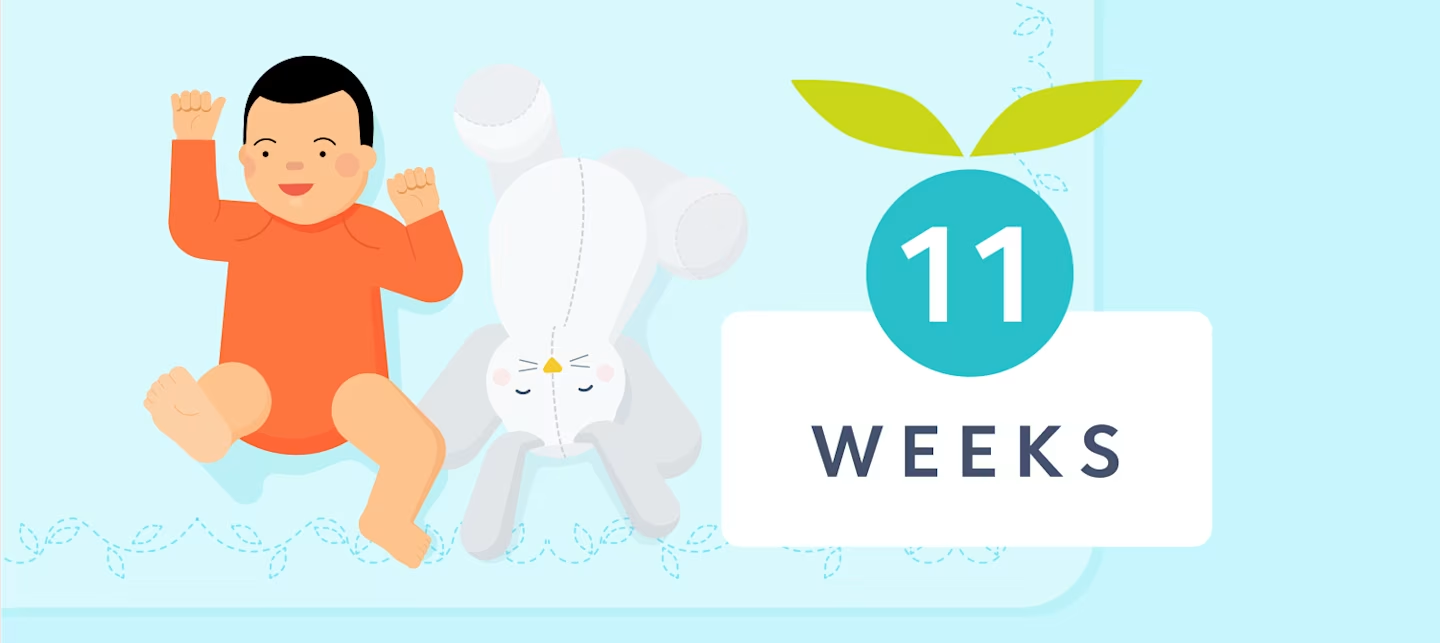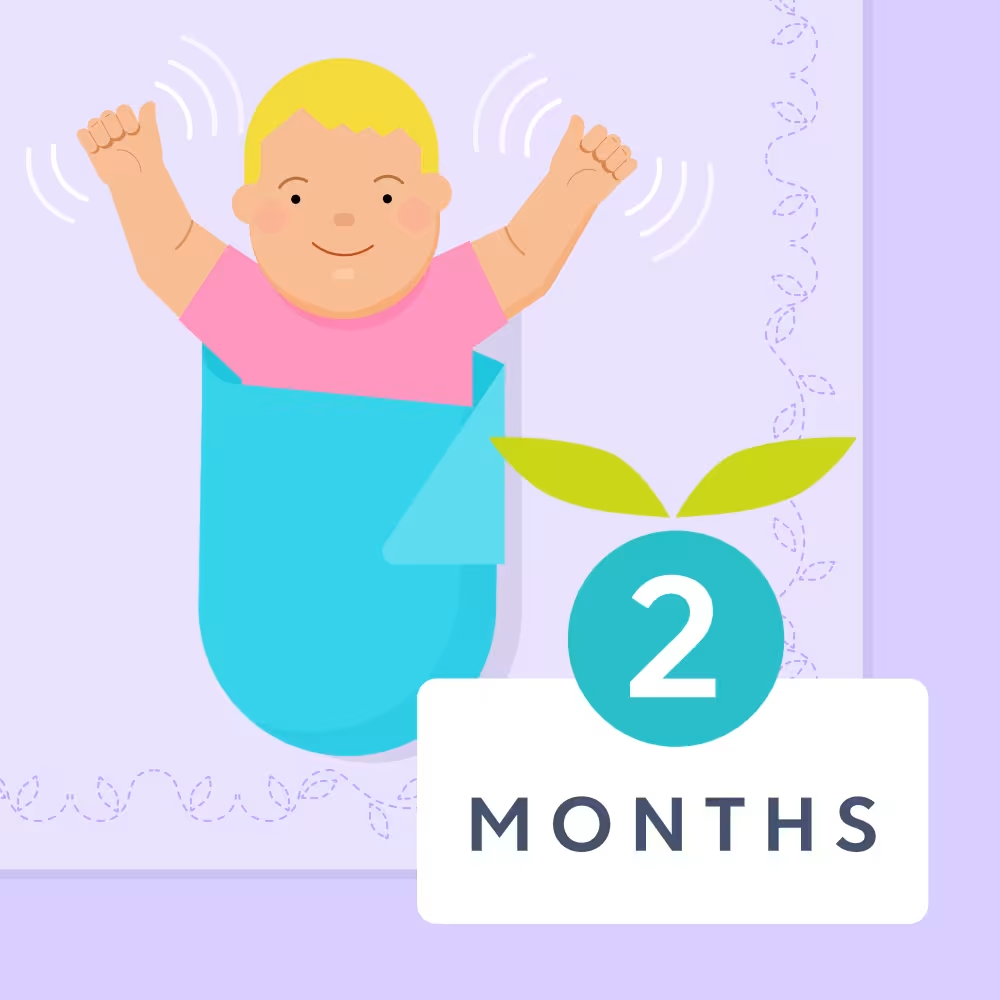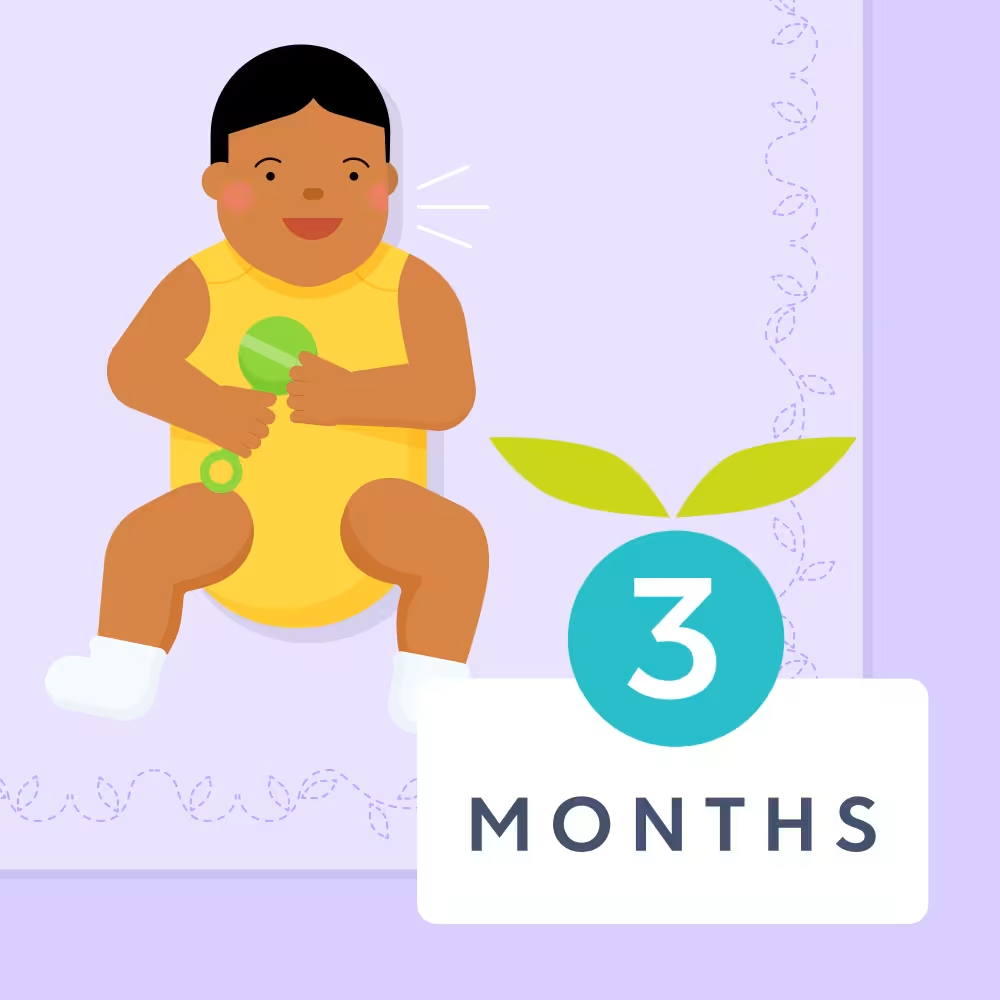11 week old sleep schedule: Bedtime and nap schedule
Updated Dec 15, 2025

At 11 weeks, your baby is nearing the end of the fourth trimester! As your little one gets closer to 3 months old, they may be growing out of their newborn sleep patterns as their circadian rhythm matures. While this can result in and shorter naps at around 3 - 4 months, we’ll also likely see a more regular 24-hour cycle of eating and sleeping along with some longer stretches of overnight sleep in this age range. The biggest changes in infants’ sleep patterns occur in the first 4 months of life [], so it’s not uncommon for sleep to be a bit bumpy at this age. Don’t fret — we are here to help you navigate any challenges as seamlessly as possible.
In this article, we’ll offer tips to help set up a good foundation for sleep at 11 weeks, give you a glimpse of 3 month sleep expectations and schedules, and answer frequently asked questions about sleep needs at this age.
How much should a 11 week old sleep?
We recommend aiming for around 15 hours of sleep over a 24-hour period . This is slightly less than the 15.5 hours we may see at around . Similarly, 2 month olds may sleep around 5 - 6 hours during the day, while at 3 months daytime sleep total may decrease to around 4 - 5 hours.
Note these figures are averages and should act as a guide for your little one’s sleep. You know your baby best! It’s normal if your child’s sleep schedule varies every day — and from nap to nap. When it comes to sleep totals, we recommend focusing on your child’s mood and energy levels instead of only looking at the number of hours of sleep per day.
Top sleep tips for 11 week olds
Tip #1: Learn how sleep architecture changes at 3 months
You may have heard of the dreaded “,” which is a biological change in sleep patterns that occurs in all babies. But did you know this change can impact sleep earlier too, closer to ?
Here’s what happens: After a child’s sleep architecture matures, they begin experiencing cycles of light and deep sleep, similar to how an adult sleeps. When in this cyclical sleep, babies (and everyone else too!) briefly wake after each sleep cycle and then enter the next one. Sleep troubles occur when a baby fully wakes between sleep cycles and needs help getting back to sleep. If your child is suddenly calling out more in the middle of the night and taking short naps, it may be a sign that this biological change is underway.
Reframing this change as a milestone in your baby’s development — instead of a giant step backward — can be helpful. Note that sleep regressions usually last somewhere between 2 - 6 weeks []. However, seeing improvement in sleep largely has to do with a baby developing and their physiological ability to on their own.
Tip #2: Aim for morning light exposure and a consistent wake-up time
At this point, you’re likely eagerly anticipating a more regular sleep schedule for your baby. One of the best ways to work towards this is by exposing your little one to morning light, which is the most powerful influence on a person’s sleep-wake schedule. For your newborn, this may look like opening the shades at wake time or going out for a morning walk.
Also, consider aiming for a consistent wake-up time each day — within the same 30-minute window. While you may rejoice if your child normally wakes up at 6:30 AM but sleeps in until 8:00 AM one morning, this variation can actually lead to unpredictability later in the day when you’re planning naps and bedtime.
Tip #3: It may be time to stop swaddling
It’s normal for babies to transition out of the swaddle at around 2 - 3 months. According to the American Academy of Pediatrics [], it’s best to stop swaddling your baby as soon as they show any signs of rolling. To make this transition a little easier, we recommend using a (wearable blanket). Sleep sacks can keep your baby warm, comfortable, and safe for sleep. It’s also a great step for your child’s !
Sample 11 week old sleep schedule
At 11 weeks, your little one's "schedule" will likely still be unpredictable. Sleep times and durations will vary and this is normal! Here's what a day in the life of a 11 week old newborn may look like:

Naptime schedule for 11 weeks
How long should an 11 week old nap?
At 11 weeks, it’s not uncommon for some naps to be short, around 30 - 45 minutes, while others are longer, around 1 - 2 hours. Short naps, while frustrating, are developmentally appropriate at this age. As your baby approaches the 3-month mark, we may see a little less overall daytime sleep. A 3 month old may sleep 4 - 5 hours during the day, which is down from the 5 - 6 hours we might expect from 2 month olds over the day. This daytime sleep is usually broken down into 4 - 5 naps.
To take some of the guesswork out of naptime while sleep is still a little unpredictable, we suggest keeping an eye on and (staring off into space, increased fussiness, rubbing their head on you) to help determine if your baby is ready to nap again. Most babies can comfortably stay awake 60 - 120 minutes at 3 months. You can also use feature to help you determine optimal nap times for your baby.
How many naps for a 11 week old?
We’ll still expect 4 - 5 naps per day for babies at 11 weeks. The number of naps in a particular day will be determined by a child’s morning rise time, how long their naps were that day, and how long they can comfortably stay awake between naps. At 3 months, typical wake windows are 60 - 120 minutes. Since your child isn’t quite 3 months old, they may be slightly shorter — around 45 minutes - 1.75 hours. In general, the shortest wake windows are typically in the morning and they increase over the course of the day.
5-nap schedule for 11 weeks
Note: Sleep needs vary by child and this chart should be viewed as an example.
4-nap schedule for 11 weeks
Note: Sleep needs vary by child and this chart should be viewed as an example.
Bedtime for 11 week olds
What time should an 11 week old go to bed?
At around 3 months we may see bedtime start to shift earlier. Bedtime will typically be 12 - 14 hours after your baby wakes for the day, but no earlier than 6:00 PM (to prevent a very early morning rise time). This means if your little one gets up at 6:30 AM, an optimal bedtime is likely between 6:30 - 8:30 PM.
A more precise bedtime will also be determined by how many naps your little one is taking and how long they can comfortably stay awake between sleep periods. If your little one is taking 4 naps, their bedtime will tend to be earlier than a baby who is taking 5 naps per day.
Why does my 11 week old keep waking up at night crying?
Your baby may be sleeping for slightly longer stretches at night at 11 weeks — a small but welcome milestone! Even so, frequent night waking is still normal and expected at this age. Most babies continue to wake for feedings and comfort, and sleep patterns can vary widely from day to day (and night to night).
Is there a sleep regression at 11 weeks old?
Newborn sleep can be unpredictable, so frequent night wakings and short naps are completely at this stage. So this phase of erratic sleep isn't considered a "sleep regression."
However, as your baby gets closer to 3 months, they may also be waking up and calling for you at night due to a biological shift in the way they sleep (often referred to as the “”). Around 3 - 4 months, infants will begin having additional cycles of light and deep sleep. They’ll begin to briefly awaken after each sleep cycle, which may lead to new sleep challenges like short naps and not being able to fall back to sleep on their own overnight.
Can my 11 week old sleep with a pacifier?
Pacifiers can be used at 11 week, but it's OK if your little one isn't into them. The AAP encourages pacifier use during sleep times, as it can provide comfort and may reduce the risk of sudden infant death syndrome (SIDS) []. They are also often recommended for preterm or low-birth-weight babies to aid in developing their sucking reflex [].
However, the AAP advises against using a pacifier to replace or delay feedings, which are crucial for your baby's growth and brain development.
Should I swaddle my 11 week old?
Swaddling is OK at 11 weeks as long as your little one hasn't started showing signs of rolling over, which may happen around this time. If your baby has rolled or is trying to roll, the AAP recommends parents stop using them immediately [].
That said, if your baby doesn't like traditional swaddles or is rolling (or attempting), there are also . Transitional swaddles and sleep sacks can offer comfort and security to your baby without restricting arm movement and can be used as your child grows.
Can I sleep train a 11 week old?
Sleep training in the newborn phase. Little ones typically need help to fall asleep (and stay asleep) at this age. If you're looking for ways to help your baby at this age, consider implementing some for healthy sleep hygiene.
Can a 11 week old sleep on their stomach or side?
The AAP does not recommend that babies sleep on their stomach or side at 11 weeks []. Instead, always place your baby on their back for sleep. This position helps reduce the risk of SIDS. Once your baby is able to roll both ways (from back to front and front to back), you don't need to reposition them if they roll on their own while sleeping.
What are the developmental milestones for a 11 week old?
At 11 weeks, your little one may be making new noises and flashing smiles! However, keep in mind there’s a wide range of what's considered normal. Not all babies hit these milestones at the same time and that's OK. If you have questions or concerns about your baby’s development, don’t hesitate to reach out to their healthcare provider.
Holds head up briefly when on tummy
Begins to push up on hands during tummy time
Moves arms and legs more smoothly
Makes cooing noises
Briefly opens or relaxes hands
Cries to communicate most needs
Smiles at your face and seems happy to see you
Looks toward loud noises
May put hand to mouth
Does a 11 week old need to eat during the night?
At 11 weeks, it’s still normal and developmentally appropriate for babies to wake up hungry during the night. Many babies also experience a around 3 months, which can lead to increased nighttime feedings. We recommend continuing to feed on demand and consulting with your pediatrician if you have any concerns about your baby’s overnight feeding needs.
Takeaway
Babies at 11 weeks aren’t ready for a structured sleep schedule quite yet, however, we can expect that little ones may sleep for about 5 - 6 hours during the day at this age.
At 11 weeks, it’s not uncommon for some naps to be short, around 30 - 45 minutes, while others are longer, around 1 - 2 hours. Short naps, while frustrating, are developmentally appropriate at this age.
Expect babies to wake during the night for feedings and comfort. Consult with healthcare professionals for guidance on night feedings.
If you're curious about what lies ahead in the next month, glimpse into the future to see what you might experience once your baby is a (including ). Take a look back at how far your baby has come by revisiting what they may have been like as a .
Share article:
Note: The content on this site is for informational purposes only and should not replace medical advice from your doctor, pediatrician, or medical professional. If you have questions or concerns, you should contact a medical professional.
6 Sources
Share article:





